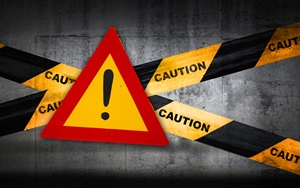
With business comes risk, as anyone knows. What many small business owners forget, though, is that this doesn't mean that they can't minimise the hazards they are exposed to. Whether it's through thorough research on the market, SWOT analysis, or looking at the business and planning for the future, there are many ways that a business owner can reduce the risks they may encounter.

What is a risk management strategy?
A risk management strategy takes a complete and analysed look at your business and the environment it's operating in. It identifies possible sources of risk, and assesses each one. The likelihood of the negative event occurring is taken into account, as well as the impact on your business if it happens.
Ranking the dangers associated with each of the risks, the plan begins with the most urgent issues then breaks down what you can do to help minimise them. The aim is to remove the risk altogether, however if this isn't possible the next step is reducing the chances of it happening and preparing a way to manage its predicted effects if it should.
Lastly, the risk management strategy is monitored and reviewed going forward, to ensure your business is always aware of the potential dangers it faces.
While risk management is essential at any level of business, small companies can see the greatest benefits from it. With fewer resources to pull on should something go wrong, there's a smaller margin of error for small businesses.
Instead of being able to take the hit, recover, and keep moving, there's a much higher chance that you'll down for the count. By preparing in advance, seeing it coming, and efficiently avoiding the blow, your company can keep fighting. And even if the risk does hit, being ready for it can minimise its impact on your business, a glancing blow rather than a knockout.

What are some business risks to consider?
There are many things that might cause harm to your business. However, when it comes to trying to evaluate what they are, there are some main areas to consider.
Not enough diversity
Consider where your business's income is coming from. Do you have only a few clients accounting for the majority of your sales?
If your business deals in a niche market this might be expected, however, it makes you more vulnerable as well. Should one or more of your clients leave, a big chunk of your profit vanishes with them.
Being aware of this allows you to seek ways to reduce the liability involved. Consider whether there are areas of your business that you could expand, to bring in a wider variety of income. Diversifying your sources of sales reduces the concentration of risk.
Even if your company is healthy, promoting your business could bring in new interest as well, widening the client base.
Compliance
Depending on your business, there's a strong possibility that somewhere along the line there are laws, rules and regulations to comply with. For example, hiring an employee brings employment law into the picture.
This brings the risk that your business isn't meeting compliance requirements.
Reviewing any grey areas of your business, or bringing in someone that can review the legal side, is a good way to ensure you are protected.

Competitors
Possibly the most obvious risk that business owners tend to be aware of are the competing companies in the same area.
Even if you know who your immediate competitors are, market research will still help, allowing you to glean insights into how the other companies are faring. Learn everything you can about them, from how long they've been in business, to possible strengths and weaknesses.
Breaking down other businesses in the same area as yours can also give you insights into what your company could do to improve its bottom line, and how to stand out against the competition.
On average small businesses are waiting 34 days to get paid by customers.
Finances
Only approximately 54 per cent of Australian small businesses are cash flow positive, according to Xero's small business insights, and on average companies are waiting 34 days to get paid. Money makes or breaks a company, and you need to know where the risks are when it comes to the company's finances.
Discuss with your accounting firm how everything is looking within the business, and consult with them on what needs to be done to maintain a healthy cash flow and prepare for any risks.
Strategic
The leadership within your company guides it and makes decisions concerning business objectives. If a strong strategy isn't in place you run the risk of floundering when it comes to making choices or jumping on opportunities. It can also leave your business feeling directionless, impacting branding, employee engagement, and the overall success of the company. Economic conditions and how these are managed and prepared for also comes under this umbrella.
As well as the above listed, consider privacy security, protection of essential documents, employee resignations, and whether or not you have the right technology for your business now and into the future, when looking for potential hazards for your business.
If risk management is something that your company needs to think about, talk to us here at WMC Accounting. With a background in accurately assessing risk, we can help protect you building a strong risk management strategy for your company.



